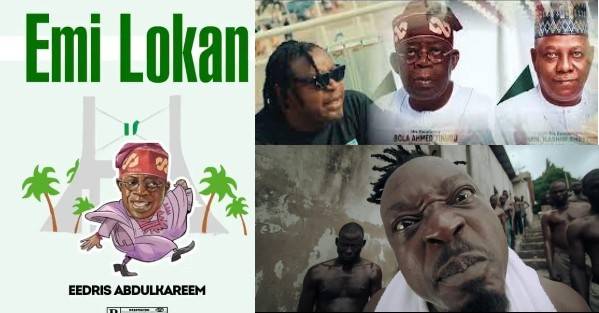Iconic Nigerian Singer Challenges Status Quo with New Release | OGMNewsNG.com Eedris Abdulkareem, the renowned Nigerian musician famous for his hard-hitting social commentary, has once again captured the nation’s attention with his latest single, “Emi lo kan” (I am next) which he replaced with “Ebi lo kan” (Hunger is next) in the new song. This thought-provoking track cleverly repurposes President Bola Ahmed Tinubu’s campaign slogan , demonstrating Eedris Abdulkareem’s unwavering commitment to using his art as a platform for social critique.
The song, “Emi lo kan” catchy melody but depicted so far by critics as flop, belies its serious message, shining a spotlight on the pervasive issue of hunger that has plagued Nigeria for decades. Through his lyrics, Eedris Abdulkareem gives voice to the millions of Nigerians struggling with food insecurity, challenging the government to address this critical issue. The artist’s ability to blend entertainment with social awareness has once again proven effective in sparking important conversations across the country.
Eedris Abdulkareem From “Nigeria Jaga Jaga” to Emi lo kan or “Ebi lo kan”
Eedris Abdulkareem’s musical evolution from “Nigeria Jaga Jaga” to Emi lo kan or “Ebi lo kan” mirrors the changing face of Nigeria’s political scene. While “Nigeria Jaga Jaga” targeted President Olusegun Obasanjo’s administration in the early 2000s, “Ebi lo kan” takes aim at the current government under President Tinubu. Despite the shift in political leadership, both songs share a common thread: they articulate the frustrations and hardships experienced by ordinary Nigerians.
This continuity in Abdulkareem’s work demonstrates that regardless of which party holds power, the fundamental challenges facing the Nigerian people remain largely unaddressed. By maintaining his critical stance across different administrations, the artist has established himself as a consistent voice for the voiceless, transcending political affiliations and resonating with the masses who continue to struggle with basic necessities like food security.

Backlash and Double Standards: Exposing Hypocrisy in Nigerian Political Discourse
The release of Emi lo kan which he also tagged “Ebi lo kan” in the single has sparked a backlash from some of President Tinubu’s supporters, known as BATs. This negative reaction reveals a troubling double standard in Nigerian political discourse. Many of these same individuals who now criticize Abdulkareem’s latest work were enthusiastic supporters of “Nigeria Jaga Jaga” when it targeted a different administration.
This hypocrisy underscores a deeper issue within Nigerian political culture: the tendency to prioritize loyalty to individual leaders over the welfare of the nation as a whole. Such blind allegiance to political figures, rather than to principles or policies, hinders meaningful progress and accountability. It also raises questions about the true nature of political support in Nigeria – is it based on a genuine belief in a leader’s ability to effect positive change, or merely on tribal and personal affiliations?
The Role of Artists and Citizens in Nurturing Nigerian Democracy
True patriotism demands that citizens hold their government accountable, regardless of personal political allegiances. The ability to criticize and question those in power, even if they are leaders one has supported, is a hallmark of a healthy democracy. Artists like Eedris Abdulkareem play a crucial role in this process, using their platforms to highlight societal issues and challenge the status quo.
As Nigerians, we must learn to separate our voting choices from our duty to scrutinize governmental actions. Only by maintaining this critical stance can we hope to drive positive change and progress in our nation. The controversy surrounding the single Emi lo kan or “Ebi lo kan” serves as a reminder that engaged citizenship requires constant vigilance and the courage to speak truth to power, regardless of who occupies the seat of government. By embracing this responsibility, Nigerians can work towards building a more transparent, accountable, and prosperous nation for all.
Table of Contents
Discover more from OGM News NG
Subscribe to get the latest posts sent to your email.














